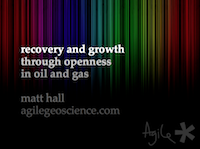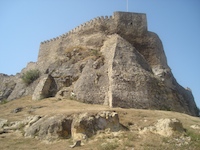Why we should embrace openness
/Openness—open ideas, open data, open teams—can help us build more competitive, higher performing, more sutainable organizations in this industry.
Last week I took this message to the annual convention of the three big applied geoscience organizations in Canada: the Canadian Society of Petroleum Geologists (CSPG), the Canadian Society of Exploration Geophysicist (CSEG), and the Canadian Well Logging Society (CWLS). Evan and I attended the conference as scientists, but also experimented a bit with live tweeting and event blogging.
The talk was a generalization of the talk I did in March about open source software in geoscience. I wasn't sure at all how it would go over, and spent most of the morning sitting in technical talks fretting about how flaky and meta my talk would sound. But it went quite well, and at least served as some light relief from the erudition in the rest of the agenda. It was certainly fun to give an opinion-filled talk, and it started plenty of conversations afterwards.
 You can access a PDF of the visuals, with commentary, from the thumbnail (left).
You can access a PDF of the visuals, with commentary, from the thumbnail (left).
What do you think? Is a competitive, secretive industry like oil and gas capable of seeing value in openness? Might regulators eventually force us to share more as the resources society demands become scarcer? Or are we doomed to more mistrust and secrecy as oil and gas become more expensive to produce?
← Click the image for the PDF (6.8M)
If you have 8 minutes to spare, you might prefer to watch and listen to an abridged version of this talk on our new YouTube channel. Given that I love presenting, I found making this little video surprisingly hard, having to pause and cringe at my voice and mannerisms every few minutes. I was aiming for about 4 minutes or so, but apparently I have issues with verbosity! I am also finding that Google's automatic transcription service is very cool... but not all that good at deciphering my accent. Here's my surreal auto-transcription alter-ego talking about interpretation tools:
...like the madagascar assaultive person school GMT from acting begins the most of the cold frames like thomas man's insect like pie for example.













 Except where noted, this content is licensed
Except where noted, this content is licensed